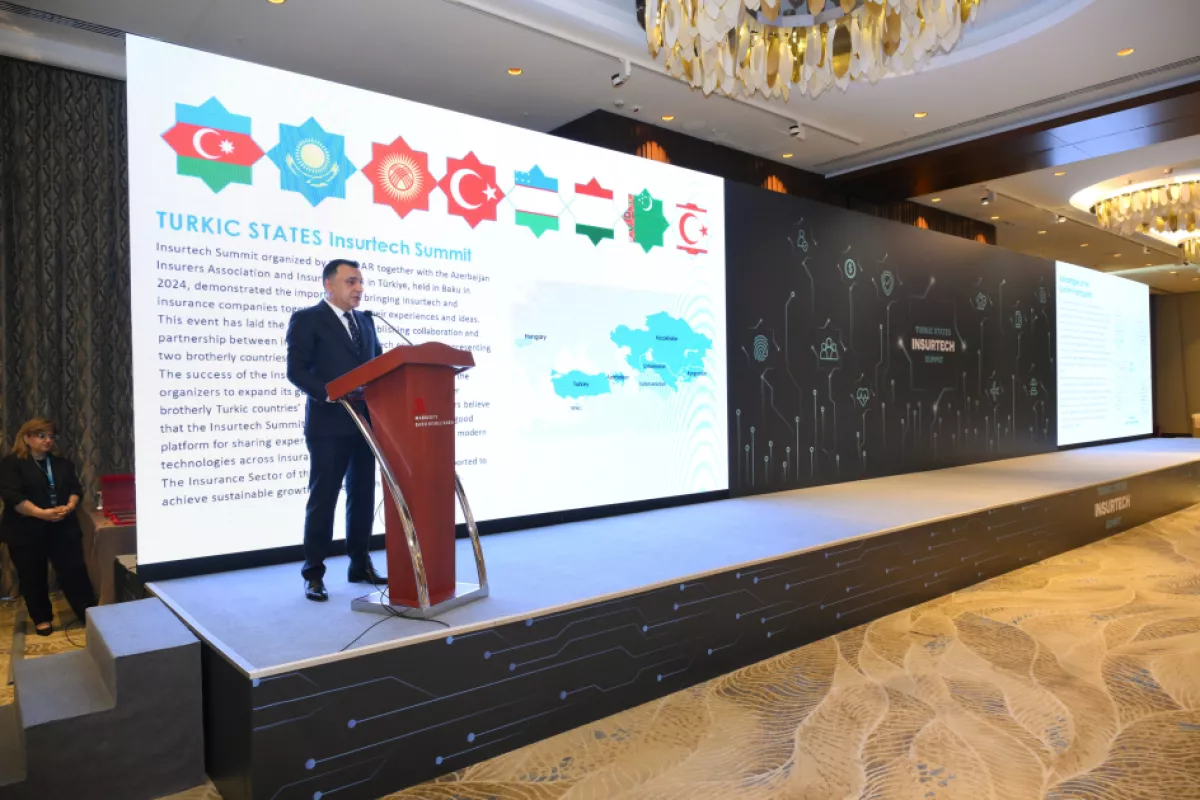Insurance cooperation: digital prospects for Turkic world insurers Analysis by Khazar Akhundov
In recent years, Azerbaijan and its partners in the Organization of Turkic States (OTS) have been working to expand intergovernmental integration in the financial sector, including by increasing access to concessional lending. Cooperation with Turkic countries significantly broadens opportunities for the development of new insurance and reinsurance products and their promotion in the common market. Prospects in this area were highlighted in Baku, where the two-day international Turkic States Insurtech Summit has just begun.
As recent experience shows, having established successful partnerships in transport, energy, and trade, the OTS member states have focused on the cooperation of financial clusters within an organisational framework. Progress has been made on this track: in May last year, the Turkic Investment Fund (TIF) was established, aimed at expanding technical and capital support for projects in Turkic-speaking countries, and the formation of a Turkic Development Bank is planned in the near future.
At the same time, in recent years, the efforts of the Azerbaijan Insurers Association (AIA) have been focused on expanding international ties, including with countries such as Türkiye, Uzbekistan, Kazakhstan, Kyrgyzstan, Pakistan, and Hungary. The close collaboration established several years ago with the Insurance Association of Türkiye (IAT) has grown beyond a bilateral format. Within a joint initiative of the AIA and IAT, the Turkic World Insurance Union was created in May 2022, with the participation of insurers’ associations from Azerbaijan, Türkiye, Kazakhstan, Kyrgyzstan, and Uzbekistan.
An important step in the cooperation of the insurance market segments of the OTS countries was the first Assembly of the Turkic World Insurance Union, which took place in Shusha in mid-September of this year.

Representatives of government agencies, insurance associations, and market participants from Kazakhstan, Türkiye, Uzbekistan, Kyrgyzstan, and the Turkish Republic of Northern Cyprus have gathered in Baku for the latest international Insurtech Summit, dedicated to new insurance technologies and opportunities for knowledge exchange, as well as studying the best global practices in the insurance sector.
The two-day event is held with strategic support from the Central Bank of Azerbaijan (CBA) and organised with the participation of the Turkish Ministry of Trade, the Turkish Exporters Assembly, the Azerbaijan Insurers Association (AIA), and the Istanbul-based company New Generation Management. The summit aims to strengthen cooperation in insurance technologies, enhance the resilience and digital maturity of insurance markets in the Turkic states, and leverage Türkiye’s experience in innovative solutions for the sector.
During the forum’s panel sessions, discussions will cover regulatory frameworks for the insurance market and the prospects of Insurtech in Turkic countries. Presentations will address the level of digitalisation in regional markets and new directions for industry development. A core project of the Turkic world insurance sector will also be showcased, and participants will explore collaboration opportunities during B2B meetings.
On the second day, the summit will focus on new insurance products based on artificial intelligence (AI) and blockchain, as well as customer experience and cybersecurity.
“In today’s world, insurance is viewed not only as a crucial tool for ensuring financial stability but also as a strategic mechanism that promotes the social well-being of society. However, the future of insurance is now shaped not only by traditional principles but also under the influence of technological innovations,” said Vusal Gurbanov, Director General of the Central Bank of Azerbaijan (CBA), during the summit.
“Advanced technologies such as artificial intelligence (AI), Big Data analytics, and blockchain make insurance processes more efficient, transparent, and customer-oriented, providing both market participants and clients with faster services, personalised offerings, and a higher level of trust.”
According to Gurbanov, automated assessments based on data engineering enable insurers to deliver more accurate and flexible services, increase customer loyalty, and reduce operational costs. In this context, the CBA places special emphasis on implementing Insurtech solutions, driving digital transformation, and creating conditions for adopting best international practices.
“The regulator highly values the role of insurance companies in this matter, as it is committed to fostering technological innovation in Azerbaijan. The Mandatory Insurance Bureau, supported by the CBA and serving as the guarantor of the compulsory insurance system, is also carrying out important work in digitalising insurance services,” Gurbanov added. “We are proud to be at the heart of this collaboration, sharing our experience in digital insurance with our brotherly countries and shaping the future of Insurtech in the region.”
In this context, the CBA Director General emphasised that the Baku summit serves as a striking example of mutually beneficial cooperation among Turkic states and will open opportunities for practical partnerships, joint projects, and new ideas. In particular, it is expected to facilitate the creation of joint, innovative, and digital platforms, foster collaboration in the startup sector, and develop a unified information platform, marking a new chapter on the region’s Insurtech map.

Overall, a recurring theme in the statements of the summit’s Azerbaijani participants was a call for Turkic states to expand cooperation in developing joint insurance products and to pool efforts in the digitalisation of the insurance sector. The latter is highlighted as a key priority in the CBA’s financial sector development strategy for 2024–2026.
“Today, the insurance sector in Azerbaijan and across the Turkic world is at a new stage of development: mutual cooperation, joint projects, and knowledge exchange within the framework of Insurtech will lead to sustainable market growth, the creation of new product lines, and increased efficiency,” said Ulviyya Jabbarova, Chairperson of the Supervisory Board of the Azerbaijan Insurers Association (AIA) and Chairperson of the Turkic World Insurance Union.
“Today’s summit provides a unique platform for sharing experience and technologies, implementing innovations, and driving digital transformation. I hope this forum will become a significant turning point for our insurance markets in terms of strategic partnership.”
AIA representatives noted that domestic insurance companies are already working on digital sales channels, mobile applications, and automated service models, with sectoral development focused on leveraging AI and machine learning, as well as the capabilities of Big Data and cloud computing.
At the same time, digitalisation is not only about applying technology but also about transforming the ecosystem while considering potential risks. This includes ensuring a high level of cybersecurity, adapting legislation flexibly to innovations, and increasing both consumer trust and digital literacy. Implementing best practices and gaining access to know-how across these areas is most effective when carried out collectively by the insurance structures of OTS member states, unifying legislation and optimising administrative mechanisms and digital platforms.
In recent years, the insurance markets of Turkic countries have demonstrated positive dynamics. Last year, growth rates were 10.7% in Azerbaijan, 41.38% in Kazakhstan, 71.32% in Kyrgyzstan, 72.5% in Türkiye, and 21.22% in Uzbekistan. Overall, the compound annual growth rate (CAGR) of the insurance markets of OTS member and observer states is expected to reach 44–51% by 2030.
The anticipated market growth, the development of institutional mechanisms, and other positive trends in the sector provide a strong basis to assert that, in the long term, the integration of insurance markets in the Turkic states will significantly increase their capacity, further promoting the convergence of the financial sector.








